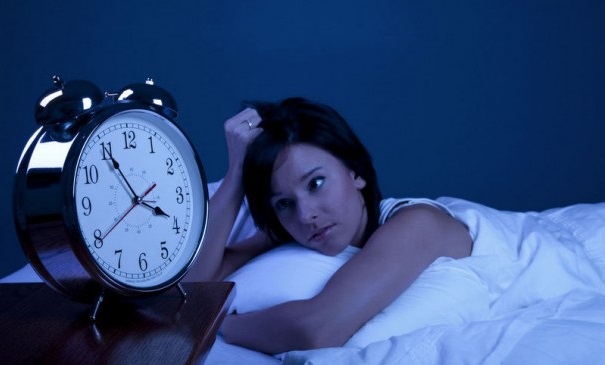Dealing with panic attacks is bad enough when you’re fully awake, but it can be many times worse at nighttime when you’re half asleep. If you’re reading this, then you’ve probably been there before. You wake up in the darkness with your heart pounding, your breathing erratic and a sense of impending doom. To make matters worse, you may be scared to go back to sleep. The resulting sleep deprivation may intensify your anxiety, spawning a negative cycle that is difficult to break.
As with daytime panic attacks, nocturnal panic attacks generally don’t pose a danger to your physical health. However, they can make you develop a fear of sleep (somniphobia), which can lead to chronic sleep deprivation.
Fortunately, there are many ways to help reduce nighttime panic attacks and calm yourself down when they occur. Read on for a few helpful tips and strategies to stop panic attacks at night and get back to sleep.
Sink into a state of calm with weighted products
Weighted products are commonly used to treat symptoms of anxiety and stress due to their ability to apply deep, soothing pressure to the body. This gentle pressure simulates the feeling of being hugged, a universally comforting act that can slow down your heart rate and counteract the effects of stress.
In the hours leading up to bedtime, try wrapping yourself in a cozy weighted robe or relaxing on the couch with a weighted blanket draped across your lap. You can also sleep with your weighted blanket or snuggle up to one immediately after experiencing a nocturnal panic attack to help lull yourself back to sleep.
Practice progressive muscle relaxation before bed
Muscle tension is one of the many ways in which our bodies can react to stress. When you feel anxious or on edge, your muscles will naturally contract to help prepare you to fight or run away. The tension we build throughout the day tends to stay with us long into the night unless we do something about it.
Practicing progressive muscle relaxation (PMR) before bed can be a useful way to combat stress and wind down for sleep. With this technique, you slowly tense up a particular group of muscles and then relax them while taking deep breaths. Like other products and techniques on this list, PMR can be helpful for both preventing panic attacks and getting you through one.
Avoid exposure to artificial light at night
Reducing your panic attacks could be as simple as limiting your exposure to blue light in the evenings. A growing body of evidence shows that street lights, car headlights, electronics and other common sources of blue light can negatively affect our mood and sleep, making nocturnal panic attacks more likely. Researchers also say that fluorescent lighting can make people with anxiety feel more uncomfortable.
If you have fluorescent lights in the bedroom or the bathroom that connects to your bedroom, make sure you replace them with incandescent bulbs. Many people also find it helpful to wear an eye mask that blocks 100 percent of artificial light.
Listen to white noise
Environmental noise is another thing that can easily disrupt your sleep and send you into a middle-of-the-night panic. Loud noises such as barking dogs and vehicle traffic can send our adrenaline into overdrive and jolt us awake.
Even softer sounds like the creaking of a floorboard can trigger your body’s natural defense system. That’s because your brain interprets these unrecognizable noises as a threat, causing you to tense up before you’re even fully awake.
White noise machines can help mask these unwanted noises, making it easier for you to sleep peacefully all through the night. If you don’t want to invest in a white noise machine, try downloading a white noise app to your phone or tablet.
Tire yourself out with exercise
There’s no doubt about it — exercise is a tried-and-true strategy for alleviating anxiety and getting a good night’s sleep. In a 2015 study, 30 sedentary young women with generalized anxiety disorder (GAD) were instructed to perform various exercises for six weeks. The researchers found that exercise significantly improved their sleep quality and lessened their symptoms.
To sleep soundly through the night, try incorporating both resistance training and aerobic exercises into your fitness routine. Just make sure you’re not going too hard right before bedtime. According to the Sleep Foundation, vigorous workouts can stimulate your nervous system and increase your heart rate, making it harder to fall asleep.
Create a coping toolkit
From grounding techniques to guided meditation, there is no shortage of useful tools for coping with nighttime anxiety attacks. But when you’re still half asleep and filled with sheer terror, remembering to access these helpful tools and tips can be difficult. That’s where creating a nocturnal panic attack toolkit comes in handy. Coping toolkits are exactly what they sound like — a toolkit filled with your go-to items that help you calm down and go back to sleep.
The best coping toolkits for anxiety tend to engage your senses. Here are a few examples to get you started:
- Lavender essential oils (smell)
- Bedtime stories for adults or a soothing music playlist (sound)
- A weighted blanket or a stress ball (touch)
- Photos of loved ones and pets (sight)
- Nighttime CBD mint (taste)
You’re Not Alone
Daytime panic attacks can be frustrating, but nighttime panic attacks are in a league of their own. But take heart — many people have found the above tips helpful in reducing their panic attacks at night. We hope they’ll do the same for you. Good luck!

